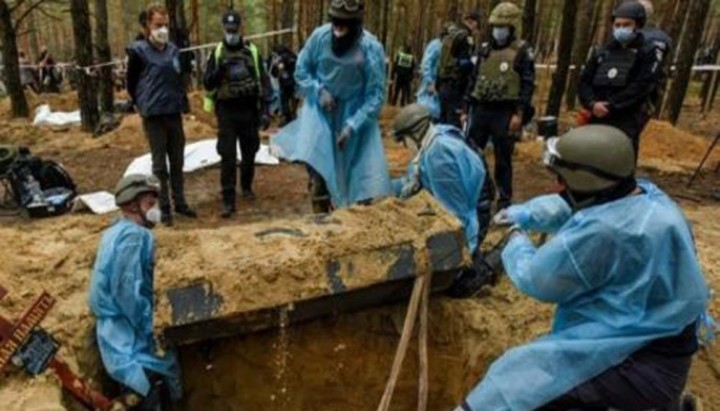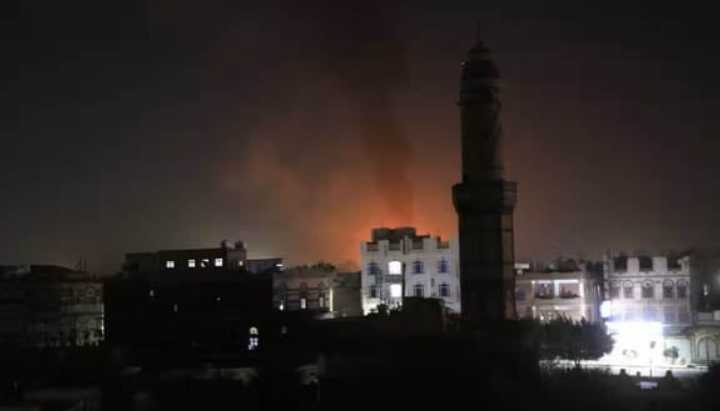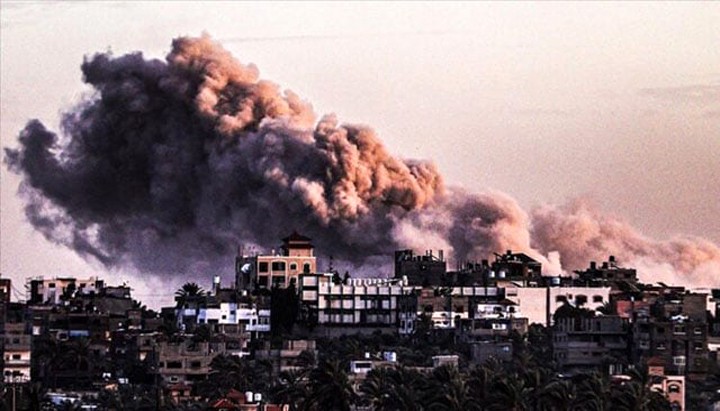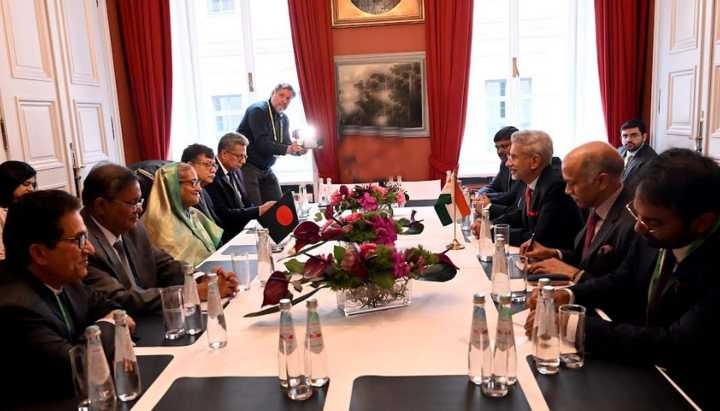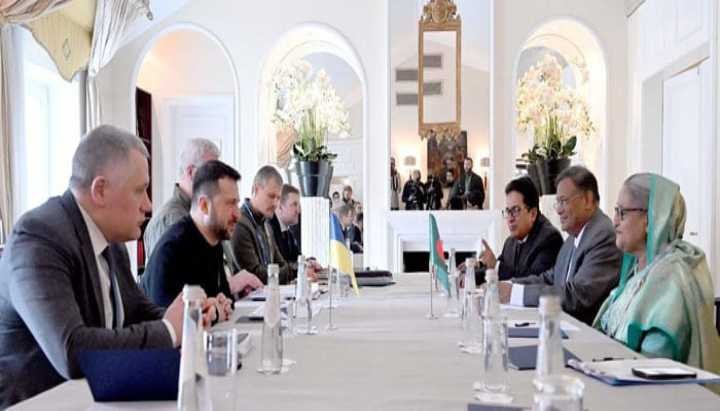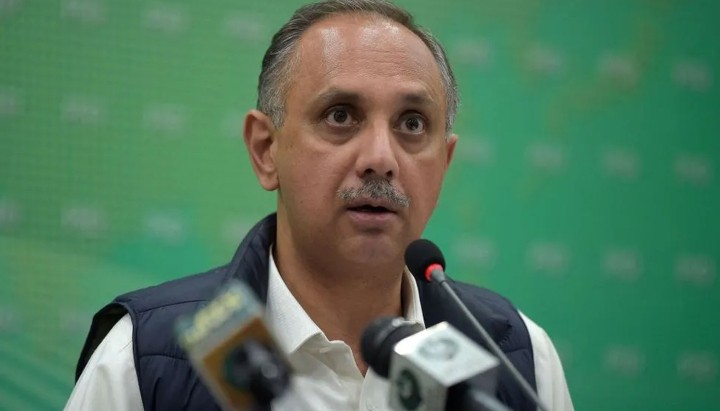Western leaders
voiced revulsion and outrage Thursday after Ukraine found a mass grave outside
the formerly Russian-occupied city of Izyum and said that almost all of the
exhumed bodies showed signs of torture.
Officials counted 450 hastily dug graves, some marked by
rough wooden crosses at the site in a pine forest only recently recaptured by
Ukrainian fighters.
"Among the bodies that were exhumed today, 99 percent
showed signs of violent death," Oleg Synegubov, head of Kharkiv regional
administration, said on social media.
"There are several bodies with their hands tied behind
their backs, and one person is buried with a rope around his neck," he
added.
"Russia leaves only death and suffering. Murderers.
Torturers," said Ukraine's President Volodymyr Zelensky. Some of the
remains exhumed included children and people who were likely tortured before
dying, he added.
The European Union is "deeply shocked" at the
newest discovery of a mass grave left by the Russians in the nearly
seven-month-old war, said the bloc's foreign policy chief Josep Borrell.
"This inhuman behaviour by the Russian forces, in total
disregard of international humanitarian law and the Geneva conventions, must
stop immediately," he said in a statement.
US Secretary of State Antony Blinken said that the graves
likely provided more evidence that Russia is committing war crimes in its
pro-Western neighbor, and French President Emmanuel Macron said what happened
in Izyum were atrocities.
"I condemn in the strongest terms the atrocities
committed in Izyum, Ukraine, under Russian occupation," Macron tweeted.
Those responsible "will have to answer for their acts.
There is no peace without justice," he added.
Putin sticks to his guns
The discovery added to the pressure on Russian President
Vladimir Putin, after his forces were driven into retreat in Kharkiv and are
under heavy pressure from Ukrainian troops ion Donetsk and Kherson.
Putin, at a regional summit in Uzbekistan, was told by
Indian Prime Minister Narendra Modi that now was "not a time for war".
The discovery also came a day after Putin admitted that
China, whose leader Xi Jinping was also attending the summit, had expressed
"concerns" about the situation in Ukraine, which Russian forces
invaded on February 24.
"I think what you're hearing from China, from India, is
reflective of concerns around the world about the effects of Russia's
aggression on Ukraine," Blinken said in Washington.
But Putin remained steadfast, despite strong evidence that
his forces incurred heavy losses in the Ukraine counteroffensive this month,
and as Washington announced another $600 million in arms and ammunition for
Kyiv.
"The plan is not subject to adjustment," Putin
said. "Our offensive operations in Donbas itself do not stop. They are
going at a slow pace... the Russian army is occupying newer and newer
territories."
Putin said the main goal of the campaign was "the
liberation of the entire territory of Donbas."
He accused Ukrainian forces of attempts to carry out
"terrorist acts" and damage Russian civilian infrastructure.
"We are really quite restrained in our response to
this, for the time being," Putin said. "If the situation continues to
develop in this way, the response will be more serious."
UN speech
As the investigation into the Izyum mass grave opened, the
United Nations overcame Russian opposition and voted to allow Zelensky to
address next week's General Assembly by video.
Of the 193 member states, 101 voted in favor of allowing
Zelensky to "present a pre-recorded statement" instead of in-person
as usually required.
Seven members voted against the proposal, including Russia,
and 19 abstained.
"We deeply regret that Russia's war does not allow our
president to participate in person," said Ukraine's ambassador to the UN,
Sergiy Kyslytsya.
Zelensky's address is slated for the afternoon of September
21, but changes are likely due to many leaders heading to London for the
funeral of Queen Elizabeth II on Monday.
Graves without names
The exhumations at the forest grave near Izyum were just a
part of the horrific revelations of the impact of the war and Russia's
occupation of the area between March and early September.
"This is part, horrifically ... of an ongoing story
whenever we see the Russian tide recede from the parts of Ukraine that it has
occupied," said Blinken.
Ukraine national police chief Igor Klymenko said they had
found multiple torture rooms in the town of Balakliya and elsewhere in Karkhiv
since the Russians were driven out.
The United Nations in Geneva said it hopes to send a team to
determine the circumstances of the deaths.
At the Izyum site two men in white overalls were digging the
sandy soil.
Soon they reached the first body, exhumed it and placed it in a white plastic
body bag. As more bodies appeared, the strong smell of rotting flesh spread
among the trees and rough wooden crosses.
Where identification was possible, names were attached to
the crosses.
At one spot, a family with a young child was buried, said Oleg Kotenko, the
government official in charge of the search for missing persons nationwide.
"They were killed. There are witnesses from the same
building. They saw what happened and buried these people here," he said.
"The graves without names are for those found dead in the street," he
said.
– BSS/AFP


